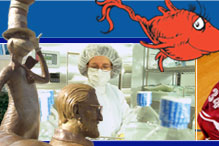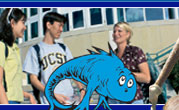| |
 |
|
 |
 |
Engineering, Jacobs School ofOFFICE: 7310 Engineering Building Unit 1, Warren Mall The Irwin and Joan Jacobs School of Engine-ering at UCSD comprises
the Departments of Bioengineering (BE), Computer Science and Engineering
(CSE), Electrical and Computer Engineering (ECE), Mechanical and
Aerospace Engineering (MAE), and Structural Engineering (SE). The
Jacobs School is directed by the dean UCSD’s six undergraduate colleges differ in their general-education requirements. Prospec-tive students should review the general-education requirements and take them into account when planning their college curriculum. Acceptance to the Jacobs School of EngineeringStudent demand exceeds program capacity in several of the undergraduate majors. Owing to limited departmental resources, major programs to which more students apply than can be accepted have been declared impacted majors. Acceptance into an impacted engineering major is based on academic excellence demonstrated in high school or at a community college. Acceptance will be granted to the maximum number of students in each of these impacted major programs consistent with maintaining acceptable program quality and in compliance with admissions procedures and criteria approved by the Academic Senate’s Committee on Educational Policy. Remember that admission to the university and to a college does not guarantee acceptance to an impacted major. FRESHMANFreshmen are admitted to engineering majors in one of three ways: open majors, pre-majors and impacted majors. Open MajorsThe following seven majors are open to all admitted UCSD students: aerospace engineering, chemical engineering (offered through the Chemical Engineering Program), engineering science (offered through mae department), engineering sciences (offered through se department), environmental engineering, mechanical engineering, and structural engineering. All applicants who have been accepted to UCSD and indicated a pre-major or open engineering major on their application are placed directly into that major. Pre-major ProgramsThere are two engineering pre-major programs offered: (1) bioengineering: pre-medical and (2) engineering physics. Incoming freshmen who identified either of these pre-majors as their first choice on their UCSD admissions application are accepted directly into these pre-majors upon admission to UCSD. Subsequent acceptance to the major is dependent on performance in selected mathematics, science, and engineering screening courses as well as competitive grade-point average in the pre-major screening courses. Pre-major engineering students are expected to apply for acceptance to the major during the spring quarter of their freshman year. Acceptance to the major is based on the grade-point average in the screening courses only. The grade-point average required for acceptance to the major by pre-majors is set individually by each engineering program. Pre-majors should consult their departments concerning the appropriate screening courses and the current grade-point average standards for acceptance. In addition to the courses required by the departments, it is expected that all pre-major students will take twelve to eighteen units of general-education college requirements during their first year. Pre-major engineering students who are not able to apply before the end of their third quarter, or who wish to reapply following an unsuccessful application, must contact their department as soon as possible for further advising as acceptance to any engineering major will not be considered after six quarters of enrollment. Impacted MajorsThe following six engineering majors are impacted: bioengineering, bioengineering: biotechnology, computer engineering, computer science, and electrical engineering. Applicants must indicate one of these impacted majors as their first choice on their UC application in order to be considered for acceptance to the major by the Jacobs School. The Jacobs School will subsequently notify all engineering students admitted to UCSD of their acceptance status. Effective fall 2001, this selection is based on the freshman review criteria (Comprehensive Review) administered by the UCSD Office of Admissions and Relations with Schools. It is strongly suggested that all students accepted into engineering programs consult their department’s academic adviser at an early stage to plan their lower-division engineering courses, and that they consult with a college academic counselor to arrange general-education courses around the required screening courses. Students admitted fall quarter should attend the engineering department’s orientation meetings during Welcome Week. Bioinformatics ProgramsStudents interested in applying to either the bioengineering: bioinformatics major (offered by the bioengineering department), or the computer science major with a specialization in bioinformatics (offered by the computer science and engineering department) should consult individual department listings which follow this section of the catalog. TRANSFERSFollowing California’s Master Plan for Higher Education, The Jacobs School of Engineering gives high priority to students transferring from California community colleges. Transfer students are admitted to engineering majors in one of three ways: open majors, pre-majors, and impacted majors. All applicants who have been accepted to UCSD and indicated a pre-major or open engineering major on their application are placed directly into that major. Effective fall 2004, it is strongly recommended that transfer students complete the following course preparation for engineering majors*:
*Effective fall 2006, these courses will be required
preparation for all engineering transfer students. **Refer to the General Catalog to select major prerequisite requirement for computer language courses. Open MajorsThe following seven majors are open to all admitted UCSD students: aerospace engineering, chemical engineering (offered through the Chemical Engineering Program), engineering science (offered through MAE), engineering sciences (offered through SE), environmental engineering, mechanical engineering, and structural engineering. All transfer applicants who have been admitted to UCSD and indicated an open engineering major on their application are placed directly into that major. Pre-major ProgramsThere are two engineering pre-major programs offered: (1) bioengineering: pre-medical and (2) engineering physics. Subsequent acceptance to the major is dependent on performance in selected mathematics, science, and engineering screening courses as well as competitive grade-point average in the pre-major screening courses. Pre-major transfer engineering students are expected to apply for acceptance to the major during their third quarter of their first year at UCSD. Acceptance to the major is based on the grade-point average in the screening courses only. The grade-point average required for acceptance to the major by pre-majors is set individually by each engineering program. Pre-majors should consult their departments concerning the appropriate screening courses and the current grade-point average standards for acceptance. In addition to the courses required by the departments, it is expected that all pre-major students will take twelve to eighteen units of general-education college requirements during their first year. Pre-major transfer engineering students must apply to the major before the end of their third quarter as acceptance to any engineering major by a transfer student will not be considered after the end the of third quarter of enrollment. Impacted MajorsSince acceptance to impacted engineering majors is quite competitive for freshman and transfer applicants alike, academic standards are high. Transferring students must demonstrate both the completion of most of their lower-division courses at the community college, and a high level of academic competence (GPA) in these courses. The Jacobs School evaluates transfer students who choose impacted engineering major programs as their first choice major on their UC application. Those seeking acceptance to the following impacted engineering majors: bioengineering and bioengineering: biotechnology, computer science, computer engineering, and electrical engineering will have their community college work evaluated by the Jacobs School of Engineering. Acceptance to impacted majors may be limited to the best transfer applicants, e.g., those who have been admitted to UCSD with the most complete lower-division preparation and the highest college grade-point averages. Since acceptance is restricted to these majors, transfer students are encouraged to apply to more than one major degree program. It is strongly suggested that all students accepted into engineering programs consult their department’s academic adviser at an early stage to plan their lower-division engineering courses, and that they consult with a college academic counselor to arrange general-education courses around the required screening courses. Students admitted fall quarter should attend the engineering department’s orientation meetings during Welcome Week. For specific program requirements for transfer students, please refer to the appropriate department’s listing which follow this section of the catalog. Bioinformatics Programs Students interested in applying to either the bioengineering: bioinformatics major (offered by the bioengineering department), or the computer science major with a specialization in bioinformatics (offered by the computer science and engineering department) should consult individual department listings which follow this section of the catalog. CONTINUING UCSD STUDENTSUCSD undergraduate students who were not accepted into an engineering major as entering students may, with engineering departmental approval, change their major to any non-impacted engineering major. Interested students should make an appointment to speak with the departmental undergraduate adviser prior to changing their major. Exceptional Admission Program (CSE and ECE Impacted Majors)Space permitting and at their sole discretion, the Departments of Computer Science and Engineering and Electrical and Computer Engineering may periodically grant admission to the computer engineering (CE), computer science (CS), or electrical engineering (EE) majors to a small number of academically exceptional UCSD undergraduate students who were not admitted to these majors as entering students. Refer to the department section in this catalog for program requirements and information. At this time, the Department of Bioengineering does not participate in the Exceptional Admis-sion Program for its impacted major programs. Access of Non-Engineering Majors to the Jacobs School of Engineering CoursesThe number of students enrolled in some courses offered by the Jacobs School of Engineering must be restricted to meet the resources available. Students who have successfully completed all prerequisite courses will be enrolled in these restricted courses in the following order:
Students should check with the departments concerning the limitations on specific courses and the requirements needed prior to attempting to enroll. Double Majors and MinorsIt is the policy of the Jacobs School of Engine-ering not to approve double majors within engineering. Students who qualify for admission to graduate school and who have the extra time are encouraged to consider co-terminal B.S./M.S. degrees in one or two engineering disciplines. Engineering minors may be taken only by non-engineering majors. Engineering Student Services (ESS)The Jacobs School of Engineering supports several programs that promote academic and professional development for undergraduate students across all engineering departments. ESS programs are coordinated with the faculty and departments and include the undergraduate Triton Engineering Student Council (TESC) and engineering student professional organizations, Career Connections, the Internship Assistance Program, and Pre-College Outreach. The Jacobs School also offers activities and services to support economically and educationally disadvantaged students as they begin engineering studies at UCSD and facilitate their retention and graduation in engineering disciplines. All engineering students are encouraged to become involved with ESS programs. Further information can be obtained at the ESS office in Room 1400, Engineering Building Unit I, or via email at ess@soe.ucsd.edu. Courses101. Team Engineering (4) Fundamental principles of team engineering practice. Team formation and leadership, project creation and management, statistical tools for quality improvement, engineering business economics, law, and ethics. Interdisciplinary student teams will research, refine, and propose the design, manufacture, and marketing of a novel engineering product. Four hours of lecture. Prerequisite: a course in probability of statistics. 201. Venture Mechanics (4) Examines the engineering/entrepreneurism interface. Discovery, development, and implementation of new product ideas. Understanding markets, competitors, and selling innovations. Cultivating effective working relationships between research, engineering, manufacturing, and marketing elements of an organization. Priority enrollment given to engineering majors. 202. Enterprise Dynamics (4) Case studies of start-ups, strategic technology management, practice in use of industrial decision-making tools, and speakers from successful firms combined with experience in making management decisions dynamically in a competitive computer-simulated enterprise. Field study of ongoing processes in a local high technology company. Priority enrollment given to engineering majors. 203. Applied Innovations (4) Course includes the examination of business plans developed by early stage technology businesses. Students expected to work on the development of business plans for real, innovative business organizations. Will explore all of the business research and analysis that needs to be undertaken in order to develop a complete business plan. Completion of ENG 201 or ENG 202 preferred. 204. Theory and Practice of University Teaching (2) Teaching and learning at the college/university level. Readings in engineering and cognitive science, plus opportunities for teaching and evaluating college level students. Covers theoretical underpinnings and the practice of teaching. Participation in some practicum teaching experience will be required. |